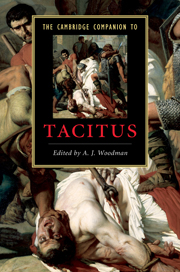Book contents
- Frontmatter
- Introduction
- Part I Contexts
- Part II Texts
- Part III Topics
- Part IV Transmission
- 16 From manuscript to print
- 17 Tacitus and political thought in early modern Europe, c. 1530-c. 1640
- 18 Gibbon and Tacitus
- 19 A dangerous book: the reception of the Germania
- 20 Tacitus and the twentieth-century novel
- 21 Tacitus’ Syme
- Chronological table
- Abbreviations and bibliography
- Index
19 - A dangerous book: the reception of the Germania
from Part IV - Transmission
Published online by Cambridge University Press: 28 March 2010
- Frontmatter
- Introduction
- Part I Contexts
- Part II Texts
- Part III Topics
- Part IV Transmission
- 16 From manuscript to print
- 17 Tacitus and political thought in early modern Europe, c. 1530-c. 1640
- 18 Gibbon and Tacitus
- 19 A dangerous book: the reception of the Germania
- 20 Tacitus and the twentieth-century novel
- 21 Tacitus’ Syme
- Chronological table
- Abbreviations and bibliography
- Index
Summary
“But a German may drink beer; indeed, he should drink it as a true son of Germania, since Tacitus mentions specifically German cerevisia.” (Heinrich Heine, Über Ludwig Börne. Eine Denkschrift. 1840) / The Germania was praised as a libellus aureus ('golden booklet') upon its rediscovery in the fifteenth century. Following centuries saw it compared to the 'dawn' of German history, a gift of a 'benign fairy' and 'a bible'. After the collapse of the National Socialist (NS) regime, however, from the vantage of hindsight, Arnaldo Momigliano gave it high priority among 'the hundred most dangerous books ever written', and added that it was 'fortunately' not his task to speak about its influence. The influence of Tacitus' Germania spans 450 years, starting with German humanists in the sixteenth century and ending with the NS downfall in 1945. Germany as a nation-state began to exist with the declaration of the German Empire in 1871. Before then, in the absence of political unity, a common past, culture and language were called upon to substantiate the German nation. But such a cultural nation has proved elusive too: the people within the Holy Roman Empire of the German Nation lived mostly in their communities with their regional traditions and local dialects and quite unaware of 'Germany'. 'What is German history?' is therefore a difficult question.
- Type
- Chapter
- Information
- The Cambridge Companion to Tacitus , pp. 280 - 299Publisher: Cambridge University PressPrint publication year: 2010
- 2
- Cited by

